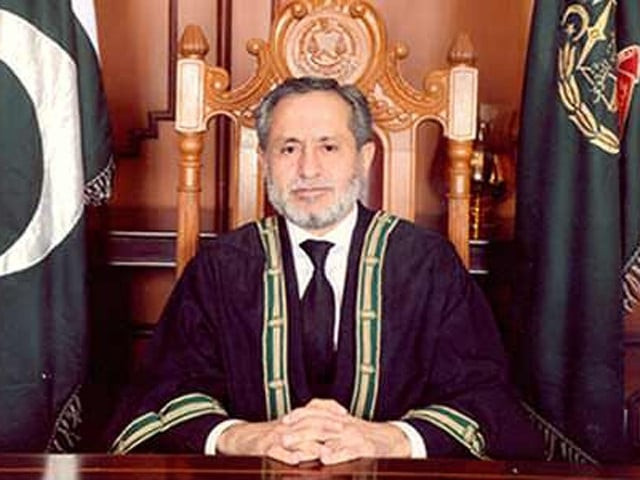What if a country violates intl law: CB judge
Justice Mandokhail was part of a seven-member CB that is hearing intra-court appeals

A member of the Supreme Court's constitutional bench (CB) hearing the military courts case on Tuesday questioned what might happen if a country violated international laws.
"What would be the consequence if international laws are not followed?" Justice Jamal Khan Mandokhail asked Salman Akram Raja, the lawyer of one of the May 9 rioters who faced trial in a military court.
Justice Mandokhail was part of a seven-member CB that is hearing intra-court appeals filed by the Ministry of Defense and some other petitioners against the SC's October 2023 verdict prohibiting trial of May 9 rioters in military courts.
During arguments on behalf of his client, Salman Akram Raja said civilians cannot be court-martialed as it means stripping them of their fundamental rights. He said court-martialing civilians also violates international standards for a fair trial.
"International standards require that trials be held in open courts, conducted independently and transparently. According to international law, trial decisions should be made public.
"Across the world, appeals against military tribunal rulings are taken to civilian courts. A ruling by the European Court has even compelled several countries to reform their court-martial procedures."
When Justice Mandokhail asked as to what would be the consequence if international principles are not followed, Raja said non-adherence to international principles means the trial was not transparent.
"Some international principles are binding, while others are not. Article 10-A on fair trials was incorporated into the Constitution based on international standards," he said.
Justice Naeem Akhtar Afghan remarked that nowhere in international principles is it explicitly stated that civilians cannot be court-martialed. However, Raja disagreed, stating that in the UK, courts-martial are conducted not by military officers but by independent judges.
He said at the time of the FB Ali case, the principle of separation of powers was not part of the Constitution. "Then deputy commissioners and tehsildars used to conduct criminal trials. It was argued then that if a DC could conduct a criminal trial, so could a colonel," he said.
In the FB Ali case, the Supreme Court had ruled that military courts had the jurisdiction to try civilians under certain circumstances. This ruling expanded the scope of military courts in Pakistan, setting a precedent for future trials of civilians and retired officers under military law.
Raja argued that all countries submit reports to the United Nations on their compliance with international standards.
"The UN Human Rights Committee reviews these reports and provides its assessment. In its October and November sessions last year, the UN committee examined Pakistan's military justice system and expressed concerns over the court-martial of civilians.
"The committee stated that military courts in Pakistan are not independent and recommended that detainees under military custody be granted bail.
"The European Commission also found the court-martial of May 9 protesters unjustified. The European Union, which granted Pakistan GSP+ status, has raised similar concerns," he said.
Salman Akram Raja stated that he disagreed with Justice Muneeb Akhtar's ruling regarding the establishment of military courts. He argued that no judge could insert words into the Constitution based on morality or past events if those words were not part of the constitutional text.
Allowing such an act, he warned, would be extremely dangerous, as judges should not have the authority to add words to the Constitution that do not already exist.
During the hearing, Salman Raja referred to former chief justice of Pakistan Qazi Faez Isa's ruling on the review of Article 63-A, stating that the same principle was upheld in that casejudges cannot insert their own chosen words into the Constitution.
Justice Mandokhail remarked to Raja that he appreciated his acknowledgment of the Article 63-A review decision, saying, "That is commendable." The court was later adjourned till today (Wednesday).



















COMMENTS
Comments are moderated and generally will be posted if they are on-topic and not abusive.
For more information, please see our Comments FAQ